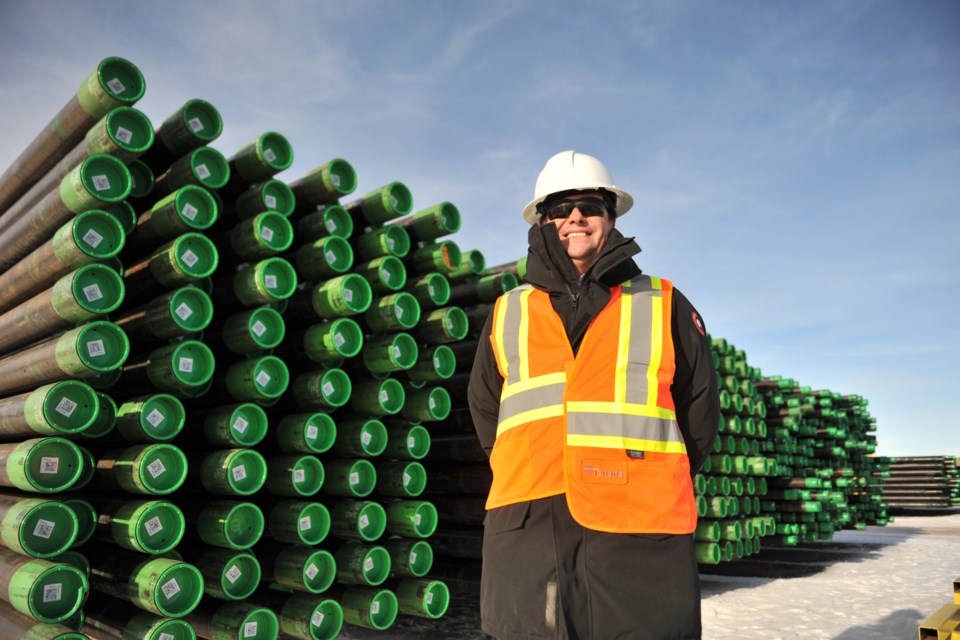Bienfait – It’s hard to miss the new, very well-lit pipe yard west of Bienfait, especially at night. That’s the new Tenaris Bienfait service centre, which is now in full operation.
Guillermo Moreno is the president of Tenaris in Canada. He visited the new Bienfait site on Dec. 13, touring the facility with Pipeline News.
Tenaris first established itself in 2015 west of Bienfait at the terminus of the CN rail line, where CN established a transloading facility. They started in partnership with CN, with services coordinated by Tenaris. Initially the employees and equipment were CN’s.
CN was doing the transloading, and it wasn’t a storage facility or pipe yard at first.
But Tenaris decided to establish their own facility, a stone’s throw away across Highway 18.
“We now have 17 employees working here,” Moreno said.
Bienfait was chosen due to its proximity to the rail line and operations of its customers. Those customers, oil companies, use Tenaris’ principal product – oil country tubular goods (OCTG) – the well casing and tubing that makes oil production possible.
About 80 to 90 per cent of the pipe that passes through their Bienfait facility comes from Canada, although a small portion does come from Tenaris’ global network of facilities. Tenaris has a seamless pipe mill in Sault Ste. Marie, Ontario, and a welded pipe mill in Calgary. In Nisku, they thread premium connections.
Moreno said all the casing coming to Bienfait was made in Canada.
Tenaris is a global company operating in 30 countries, operating in Canada since 1999. They employ about 1,000 people in Canada.
A few months ago the company opened a new Grande Prairie, Alta, service centre which services northwest Alberta and northeast British Columbia. Moreno called it “One of the best pipe yards in the world.”
At Bienfait, construction started about a year ago. The landowner prepared the ground to stringent specifications, with plenty of compaction to prevent dust in summer. The brilliant lighting is aimed to fall principally within the fence line, and fall off immediately outside of it.
Open facility
Typically pipeyards are affiliated with trucking companies. Those companies often act as “pipe custodians,” storing pipe, often at no cost, with the expectation the oil company will use their trucks to eventually haul the pipe.
Moreno explained the Bienfait service centre is an “open facility.”
“We don’t own trucks. We’re not in the trucking business,” he said. The oil companies decide which trucking firms they want to employ.
“We subcontract different cargoes,” he added.
They do have heavy duty trailers to shuttle pipe from the railyard to the pipe yard. Specialized forklifts can reach down into rail cars to unload the pipe.
Rig Direct
Tenaris has made its pipe inventory system “smart,” in that every single joint of pipe is tracked, in a business model known as “Rig Direct®.” It includes a suite of services including technical consulting, pipe management, and field services.
One end cap protector on each joint of pipe has an RFID (radio frequency identification) tag, and the other end incorporates a 2-D barcode similar to a QR code. Moreno explained they “allow us to know exactly this pipe, where it is produced, dimension, weight, thickness. We keep track of all of this for our clients. We keep track of every single pipe.”
Information is also stencilled on the pipe for when the end cap is removed.
In the yard, that means they can use a scanner to quickly identify each pipe. When a load is apart from the racks, such as on a truck, they can identify the entire load by RFID with a quick scan.
And that technology is applicable for the end user as well. The Tenaris PipeTracer app, found on the respective app stores, allows workers in the field to use all that information as well. As each pipe is precisely measured in the factory, that information can be used instead of using a tape measure in the field.
How did they get to this point?
Moreno said in 2014 the price of oil was high and everything was fantastic. But then the downturn hit. “We had to do something different to help our clients,” he said. “That kind of innovation could bring a lot of savings to our clients,” he said. The result was Rig Direct.
“Every pipe has its own RFID,” he said.
“We are the only ones doing this.”
Tenaris also has dopeless technology with a specific dry coating meaning pipe dope is not applied. This is used offshore, he noted, as the company supplies pipe to the offshore oil industry in Newfoundland.
While trials have been done in Western Canada, cost is a factor.
Domestic supply chain
Moreno commented on the importance of having a domestic supply chain. “This is the fantastic thing about energy, and where we need to help everybody in Canada to understand and connect the dots, of the benefits of the development of natural resources, how they impact the total Canadian economy. We connect Canada. We have a supply chain from Quebec, all the way to Alberta, Saskatchewan, Manitoba and British Columbia. We take iron ore produced in northern Quebec that is converted into steel in Ontario, then into pipe in either Ontario or Alberta. Then we have dedicated service centres in Alberta and Saskatchewan, and also in St. John’s, Newfoundland.
“Oil and gas means jobs across Canada, not just in the energy industry.”
To support careers for the next generation, Tenaris has supported a program connecting children with STEM – science, technology, engineering and mathematics. In September they donated a half million dollars to the University of Alberta’s “DiscoverE” program, and that will benefit children in Estevan and Bienfait. Thirty children from Grade 2 to Grade 7 can take part.




